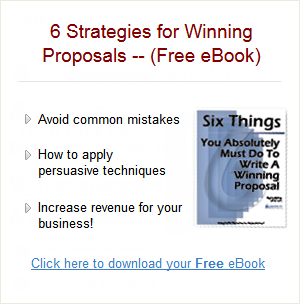How to Get Your Expertise Used
This one’s for you marketing professionals.
As your firm’s resident “proposal specialist,” do you ever find yourself frustrated because you know what the right thing to do is but no one seems to want to hear you say it? Do you ever wish people would use your expertise more fully, would seek your professional advice about proposal strategies and tactics, or listen to you seriously when you give it?
Maybe you should consider repositioning your role in the company from a support person to the technical staff to being an adviser to the proposal teams. In other words, being an internal consultant to the staff.
You probably already act in the consulting role. When someone on the staff asks your professional opinion and you give it, you are acting as a consultant.
But getting recognized as an internal consultant can be challenging. What it means is re-shaping the image your colleagues have of you. How do you do that?
The first thing you have to do is decide what you’re selling. Do you want to be viewed as a proposal strategy expert, someone who should attend early strategy sessions? Or as a writing consultant, someone who can help the technical staff put together their sections in a persuasively? Whatever you decide, you need to devise strategies for marketing yourself.
Next, find an in-house sponsor. This could be your boss or one of the principals/owners in the firm. It needs to be someone with the clout to be able to announce your status as a consultant and who can help see that you are regarded that way.
In the meantime, you can take the “guerilla” approach-just start doing it. Be proactive in suggesting better ways to run the proposal process, and demonstrating how to do it. Offer to revise sections; make specific appointments with the writers to learn exactly what they are trying to say, then put a proposal spin on the section. Suggest quick and easy ways the writers can show their ideas graphically-and give specific examples.
And don’t be afraid to toot your own horn. Instead of saying, “Here’s an idea that might help,” say, “I’ve been thinking about your section, and I came up with a suggestion for making it more persuasive.” Remember that you’re selling the new image of yourself.
What are the benefits of being an internal consultant? In the first place, your perceived value to the firm will increase; the more you work closely with people the more they will see firsthand how important you are to the firm. This, in turn, results in greater job security, and can serve as a springboard for you to seek greater responsibilities.
In addition, you will add more variety to your job, which can make it more interesting. You will also see more concrete outcomes, and will feel you have accomplished more.
Finally, and most important, you will feel more valued on the job; as your reputation for problem-solving grows, people will seek you out to help provide solutions.
Internal consulting isn’t for everyone. But it can be a rewarding experience in many ways for those who want to put in the work to make it happen.

